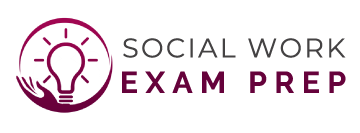
How to Study for the Social Work Licensing Exam: Tips for Success
Studying to become a social worker allows you to create a career around your passion for serving and making a difference for people. There is a significant impact on your occupational path if you secure your license after graduating with your MSW. First, you need to pass the national licensing exam. The exam has 170 questions that cover topics including but not limited to supervision, community organization, assessment and interviewing, practice theories, intervention strategies, and the DSM-V. The test is offered throughout the year in all states and jurisdictions. Being prepared to take the exam can help ease your mind, give you confidence, and improve your score.
Preparation is the Key
Knowledge is power and knowing what to expect on your social work licensing exam is half of the battle. The ASWB recommends you take the time to prepare for your testing experience. Preparation can take many forms. Studying the content for the exam is the most common form of preparation. In addition, there are external factors that should be kept in mind as well. We also need to check in with our personal needs leading up to test-taking day Being cognizant of these areas will help you reduce stress and prevent any other issues from unexpectedly popping up.
Here are a few ways you can mentally and physically prepare yourself for exam day:
- Read the ASWB Exam Guidebook and the Candidate Rules Agreement When you register and again closer to your test day. It will provide you with valuable insight into testing procedures and requirements.
- Check your email regularly for important updated information or possible changes to the testing status.
- Bring two IDs to the test center. See the Exam Guidebook for details on what IDs are required.
- Arrive at least 30 minutes before your appointment. You don’t want to be late! Late arrivals are treated as no-shows and your exam fee is forfeited.
- Consider making a dry run a week before to scope out the location, traffic concerns, and parking options.
- Be ready to have your photo taken and the palms of your hands scanned for identification purposes.
- Sign the Candidate Rules Agreement before testing.
- Know that they will put all of your belongings in a locker. If you need to access something during the time that you are taking your test (snacks or water), put it in the front so you are not rummaging.
- Retain your unofficial test results after you complete the exam; you cannot get another copy.
Plan Your Study Schedule
The best way to prepare for the social work licensing exam is to create a study schedule. Make a calendar of the days, weeks, and months leading up to the exam. Take advantage of this time not just to study and review your materials, but also to learn about exam-taking strategies. If you haven’t already, start marking the days leading up to the exam as “NO DISTRACTIONS” on your calendar.
Successful exam preparation also includes building a network or team of support around you. Here are some questions you can explore as you prepare to take the LCSW/LMSW exam:
- Who can I meet up with, or call, to share how I’m feeling?
- Can I form a study group to review questions?
- Who can be my accountability buddy? (think friends, colleagues, family)
- Are there professionals I can turn to for support?
Practice, Practice, Practice!
When it comes to taking your exam, the most important thing you can do is practice! Every time you practice, there will be improvement. The quote “Practice never makes anyone perfect, it only increases their improvement.“ by Vikrant Parsai is a great perspective.
The earlier you can start practicing, the better, but between 30 and 45 days is ideal. And keep in mind that you want to practice studying the way you learn. So, if you’re a visual learner, find a course that has presentation-style materials for you to watch. If you’re an auditory learner, lean into study materials you can listen to. If you are a tactile learner, make index cards to carry with you and review.
Take Care of Yourself
When preparing for the exam, maintain a healthy diet and get plenty of rest. It is easy to become overwhelmed and overworked. When your physical health is neglected, your mental health will follow, creating an unneeded obstacle to your test success.
Be sure to take breaks! If you study all day without taking breaks, you may feel overwhelmed and stressed. When you begin feeling overwhelmed, take a step back. During the exam combat fatigue and stress by taking minor breaks during the hour to stretch, breathe or walk out of the room to calm your mind. When you come back, you can re-focus on the task at hand with a refreshed outlook, ready to conquer the rest of the exam.
Recognize test anxiety! Spend as much time studying the exam topics as you do finding ways to manage your anxiety! Test-taking anxiety is real, so I invite you to start by replacing your negative thoughts like “I’m going to fail” with, “this may be hard, but I’ve got this success!” Try keeping your why at the forefront of your mind rather than just thinking about the potential outcome.
Here are a few signs you might be experiencing anxiety:
- Feeling nervous
- Feeling helpless
- A sense of impending panic, danger, or doom
- Increased heart rate
- Hyperventilation
- Sweating
- Trembling
- Obsessively thinking about the panic trigger
We are here to help you pass your test online from anywhere in the country. Get started today!
